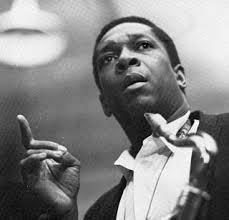US Navy Honors Coltrane With Birthday Concert
by Con Chapman
HONOLULU, Hawaii. On the surface, there couldn't be two more improbable musical bedfellows than the U.S. Navy Band and John Coltrane, the fiery tenor saxophonist who changed the course of jazz with his 1960 album “Giant Steps.” But current Navy Commanding Officer/Leader Captain George N. Thompson says those differences disappear upon closer examination.

John Coltrane
“Coltrane was famous for his 'sheets of sound,'” says Thompson, referring to the jazz giant's intense and unrelenting solos. “We make sounds, we call sails ‘sheets', and just about everywhere we stay has sheets on the beds.”
U.S. Navy Band: “A love supreme—a love supreme—”
As unlikely as it may seem, Coltrane was in fact a member of the U.S. Navy Band in 1947 in Honolulu, and the Navy is celebrating his birthday today with a series of concerts that apply “Trane's” modal approach to Navy standards such as “Anchors Aweigh”.

“Blow man, blow!”
“We're going to let our lead tenor, Mitchell ‘Frosty' Robinson have an hour-long solo,” says Thompson, “and we're going to try a new arrangement of The Village People's ' In the Navy' with minor thirds progressing to fourths in the bass line, like ‘Giant Steps.'”

The Village People: Naval Commander at far right.
Coltrane's art became increasingly spiritual over the years, causing jazz aficionadoes at clubs such as New York's Village Vanguard to scream “My God—is this solo ever going to end?” Doubters who longed for the good old days of “sweet” jazz as purveyed by big bands such as Kay Kyser and his Kollege of Musical Knowledge were eventually won over when they noted the resemblance between Kyser's academic gown and the African dashiki that Coltrane followers such as Archie Shepp adopted to emphasize their roots.


Kay Kyser and Archie Shepp: The similarities are striking.
In a proclamation honoring Coltrane's life and work, National Endowment for the Humanities board member Bruce Turner praised Coltrane not just for his innovations but also for his dedication and perseverance in pursuit of his art. “Anybody who can play ‘Anchors Aweigh' over and over again without going crazy is a better man than I.”
|
0
favs |
1012 views
6 comments |
393 words
All rights reserved. |
Author's Note
The author has not attached a note to this story.
Other stories by Con Chapman
Tags
This story has no tags.
nice one, Con.
And the amazing thing is, the part about Coltrane being in the Navy band is true.
Not in the army band, but believe Hendrix was also in the military
That would have made for a weird version of "When the Caissons Go Rolling Along."
He *did* finally get a chance to play The Star Spangled Banner.
I heard him do it, in 1969. I don't remember anybody standing up or taking off their hats, however.